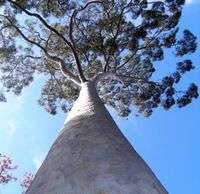Study finds trees not so large carbon sinks

The capacity of trees to counter rising carbon dioxide levels in the atmosphere may not be as great as previously thought, according to a new study with significant implications for predicting future climate change.
While trees initially seem to grow faster or larger as carbon dioxide (CO2) levels increase, the higher growth rates cannot be sustained because the availability of soil nutrients remains finite, suggests the study by US and Australian scientists published in the journal Proceedings of the National Academy of Sciences.
The study, led by Dr. Richard Norby of the Oak Ridge National Laboratory, Tennessee, included Professor Ross McMurtrie of the UNSW School of Biological, Earth and Environmental Sciences.
It updates a long-running experiment in a deciduous forest stand in Tennessee that has been exposed to elevated CO2 levels about 25% above the current atmospheric concentration – effectively exposing the trees to what that ambient CO2 concentration is expected to be in about 2050.
It had been widely thought that increasing CO2 concentrations would stimulate plant growth, which in turn would absorb enough carbon from the atmosphere to slow the rate of CO2 increase.
That belief appeared to be confirmed by the first six years of the experiment, during which the net productivity of the forest was significantly increased. But the new report has revealed that in the subsequent five years the net productivity of the forest has declined, a fall attributed by the researchers to the limited availability of nitrogen in the soil.
The researchers say the experiment provides strong rationale and process understanding for incorporating nitrogen limitation and nitrogen feedback effects in ecosystem and global models used in climate change assessments. In short, the study suggests that terrestrial vegetation will not be as large a carbon sink as previously thought.
"We're going to have to learn not to trust in trees to remove as much carbon from theatmosphere as we had hoped," says Professor McMurtrie.
He has also been part of a similar study, the Hawkesbury Forest Experiment, near Sydney, in which the responses of Australian eucalypt trees are being followed.
The new findings may be especially pertinent for trees growing in low-nutrient soils, as occurs in much of Australia
Provided by University of New South Wales
















